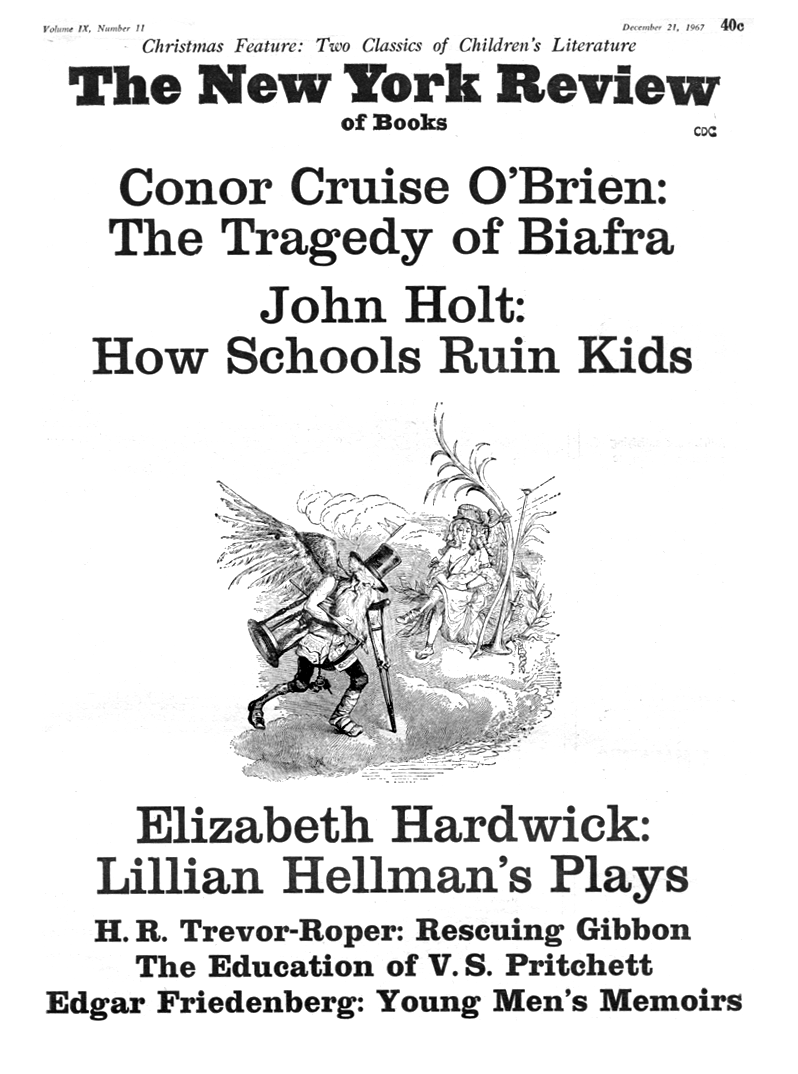In response to:
Counter-Songs from the November 23, 1967 issue
To the Editors:
Reviewing Edward Field’s recent volume of poetry in your issue of November 23, Mr. Robert Mazzocco takes me to task in his inimitably urbane, witty way for my brief notice of Mr. Field’s first volume that appeared in Partisan Review, Summer, 1963. This is all very well, except that Mr. Mazzocco credits me with statements I couldn’t be brainwashed into making, nor can I imagine how he brainwashed himself into imagining I said them. He says I described Mr. Field as writing poems “like little girls with little curls playing Chopin in the afternoon.” Mr. Mazzocco’s unassisted memory not only falsifies the imagery, but ascribes to me lines that were written by Mr. Field. I quoted nine lines from one of Mr. Field’s poems which I found agreeable in their manner. These are the lines:
Chopin is such a great composer
I can even write poetry while his music is on the radio
Which is unusual for me,
He makes my fingers tremble like ballerinas on the keys.
He says, Let’s go to town slam- bang on the whole goddam machine.I love you Chopin in spite of the million fingers
Of little girls with long bobbing curls
Practicing your notes through day- light hours
But mostly three to five after school.
I had only one sentence of comment on these lines: “Mr. Field writes verses the way some boys skip rope.” I hadn’t meant to be coy here, but after reading Mr. Mazzocco I tremble lest my manner be misinterpreted. I had meant to point, in the image, to the playful, carefree rhythmical movement of these poems, which is their most attractive quality.
Finally, my judgment of Edward Field as a poet is by no means what Mr. Mazzocco, quite gratuitously I feel, has gone very much out of his way to imply. I summed up my opinion by quoting from a poem I particularly liked, “Graffiti”:
Blessings on all the kids who im- prove the signs in the sub- ways….
A boy and a girl are giggling behind an iron pillar;
And although the train pulls in and takes them on their way
Into a winter that will freeze them forever,
They leave behind a wall scrawled all over with flowers
That shoot great drops of gism through the sky.
And I commented: “This puts me in mind not of Holden Caulfield in an outspoken moment, but of Perdita and Florizel choreographed at the modern equivalent of a sheep-shearers’ feast by Jerome Robbins. The remark is not meant to be frivolous. I sense a certain perception and substance in Mr. Field’s verse, but I find it a little difficult to isolate in his particular style.” The positive virtues of the poetry I hinted at in my very brief comment seem to me to have held out hopes for a far happier development of Mr. Field’s talent than anything I can discover in Mr. Mazzocco’s paean of praise for a less accomplished book.
True, I found some of his poetry “sweetened with qualified sentimentality.” I would now say, having read Variety Photoplays that the sentimentality is considerably less qualified today than it was in 1963. Mr. Mazzocco may find my praise too restricted and cramped, but surely for one with the dour personality he imagines I possess, it is a good deal. At any rate, as a reviewer I have always tried to avoid public love-making as well as public mayhem. But to every critic his own conception of his role!
Marius Bewley
Staten Island, New York
Robert Mazzocco replies:
I have nothing but admiration for Marius Bewley, and sincerely regret, in a good-natured reference to him, giving the impression he said something he did not say, especially when what he did say would have served my purpose as well: “Mr. Field writes verses the way some boys skip rope.” Of course, while it is perfectly true that boys who skip rope generally tend to be very like little girls with little curls, it is altogether optional whether or not they play Chopin in the afternoon. My distinct impression of Professor Bewley’s review was that he was being “uppity” about Edward Field; I notice nothing in the quoted passages in his letter that would make me change my mind. My own review was intended as an affectionate parody of Edward Field’s style. I thought the tone inescapably (if gently) ironic (all those kooky juxtapositions), and, while I do indeed like Edward Field, I cannot imagine anyone, certainly not Professor Bewley, considering it a “paean of praise.” But perhaps critics shouldn’t read one another, at least “dour” and “witty” ones shouldn’t.
This Issue
December 21, 1967


